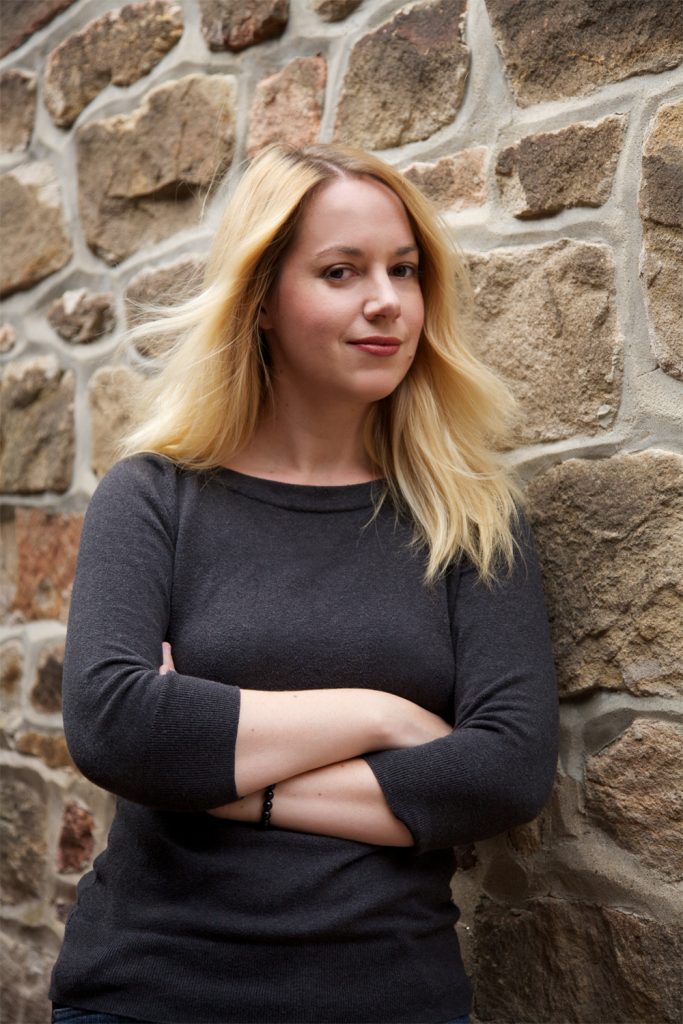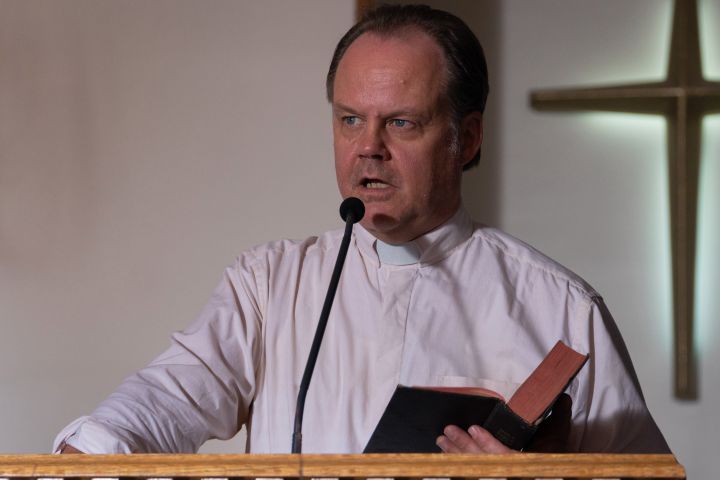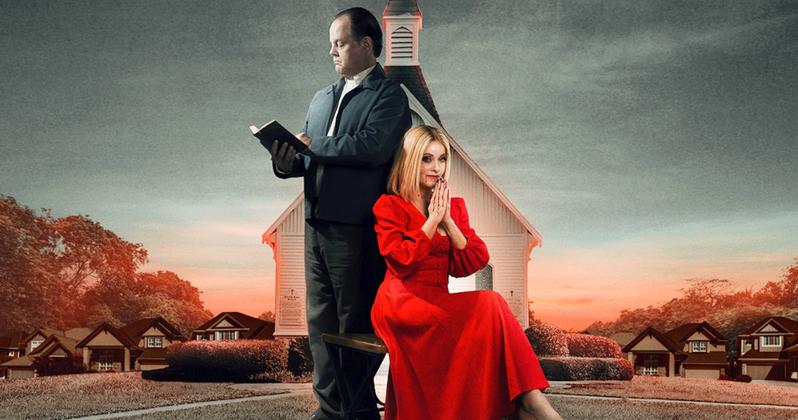Jakob’s Wife is part of an emerging breed of character-driven horror films with a comedic slant. We spoke with the writer of this film, Kathy Charles on bringing the story of Father Fedder (Larry Fessenden) and his bored wife Anne (Barbara Crampton) in search of life beyond marriage in a small town.
Horror/biopic was Charles’ entry point into the business with The Kings of Maine, a Stephen King biopic which landed her a spot on the Blacklist. “My career could have gone into either writing biopics or horror movies,” she explained. “There were more opportunities for women writers in the genre space, so I chose horror.”
Rather than opting for a blood fest, the screenwriter choose stories which are character driven arising from specific scenarios. She also stated she likes horror films which are tragic. “I want the audience to be moved by what they’ve seen and give them something to think about. I gravitate more towards heavier stories which put the audience in a place of contemplation.”
Like most horror writers, Charles also has her favorite films which shaped her storytelling. She cites her favorites horror films as Carrie (from a novel by Stephen King, hence her biopic) and An American Werewolf In London (written by John Landis). Charles highlights the importance of strong characters so the audience cares about the dangers they are going through. “Many horror characters are there to be eventually killed off. I prefer to write characters you can become attached to.” She approached Jakob’s wife as a relationship drama and murder mystery rather than a vampire film to make her point. Her main goal was to ensure that the actions of the characters best represented who they were.

Kathy Charles
The original screenplay was written by Mark Steensland (Midnight Run) which won a screenwriting contest. Eventually it found its way into the hands of Barbara Crampton who starred in and produced the film. Kathy Charles was recruited to rewrite the script to address the competing ideas in the story. “They needed someone to bring it all together and make it a cohesive whole.” It was also important to hire a female screenwriter to lend her perspective of married life to Jakob’s Wife.
Charles and Crampton worked on the screenplay for some time before direct Travis Stevens (Girl On The Third Floor) came on board.
Curiously, Charles chose to flesh out Jakob’s character more than Anne’s in her drafts. “Jakob was a pastor, but not enough was said about his crisis of faith. I really leaned into the religious idea that when his wife Anne became a vampire, he had to struggle with this evil.” The screenwriter also made Anne’s character more active in the story rather than a bored wife simply seeking excitement. In earlier incarnations of the story, Jakob was more active in finding The Master (Bonnie Aarons) who turned Anne into a vampire. Kathy wanted Anne to be more active in finding a solution to her situation.
Kathy Charles shared Travis Stevens’ cinematic inspirations for Jakob’s Wife. She quotes A Woman Under The Influence along with other films by John Cassavetes which explore a mature woman at a turning point in her life. Charles also looked to Paul Schrader’s First Reformed to flesh out Jakob’s character, a small town preacher who’s a highly-scrutinized fixture in his community, and struggles with his personal life. She also paid homage to Salem’s Lot (a TV series adapted from a novel by Stephen King) which is also set in a small town and contains vampires, as well as Martin from horror veteran George A. Romero. “These were the three films that played in my mind as I wrote Jakob’s Wife.”
Who’s Story Is It?
Jakob’s Wife, is ostensibly Anne Fedder’s story. However, Jakob similarly has an important character arc. Charles’ “two main character” approach stems from her love of stories about marriage. “You have two choices in a marriage. You can grow with your spouse or you can reject their growth.” Although this is Anne’s journey, Jakob needed to grow with her. She wanted to explore the notion of the perception of how irritating habits can be in one long-term marriage and endearing in another. Jakob and Anne were at a crossroad in their marriage. They both deeply loved each other and determined to figure out their situation together. By the end of the film, the fate of Mr. and Mrs. Fedder’s marriage is unclear. Charles deliberately left this up to the audience. “After the final scene, I wanted the audience to ask themselves how far they would go for their partners as well.”

Jakob Fedder (Larry Fessenden)
Marriage lulls are nothing new in cinema. Couples want to explore whether there is more to life than marriage. Whether there are opportunities from the past they could revisit. An event such as the re-emergence of an old flame can certainly trigger these feelings and reignite a reinvigorated outlook on life. Curiously, Jakob isn’t entirely alarmed by Anne’s transformation into a vampire. In fact, he receives some excitement from it.
“Comfort in a marriage can bring a certain kind of recklessness.” Jakob isn’t as attentive to Anne as he once was and takes her for granted. He becomes too comfortable. “Jakob’s Wife isn’t a rally against small-town life. It’s a rally against complacency in relationships.” Anne’s reaction to her shrinking marriage is an expansion into a larger than life vampire.
The Master who encourages Anne Fedder to live boldly “represents the untethered woman that many married women fantasize about. She rejects the conventions of society. She’s wild, primitive, and lustful. She’s an ideal for women trapped in life’s humdrum circumstances and can’t be free to be themselves. The Master is the extreme of the wild feminine.”
Paradoxically, the Master also seeks comfort and security in Anne.
Jakob’s Wife’s tone ranges from blood-curdling horror to amusing. “The comedic flourishes can take the story into another realm.” Charles confesses to being a fan of such tonal shifts in movies. “I don’t like films which are too one way or the other because life’s not like that. It’s more indicative of marriages.” Moreover, vampire lore frequently lends itself to various campy comedic shades. Horror audiences expect “a good time, suspense, thrills and scares. It’s a balancing act.”
In conclusion, Kathy Charles believes that successful writers should have the ability to mine an unfamiliar concept in a story, or mine a familiar one in a new way. “Great writers express the humanity of their characters and are curious, flexible, collaborative, and can take notes (even the bad ones).” A story without a compelling emotional backbone and strong characters with solid goals cannot be saved.
